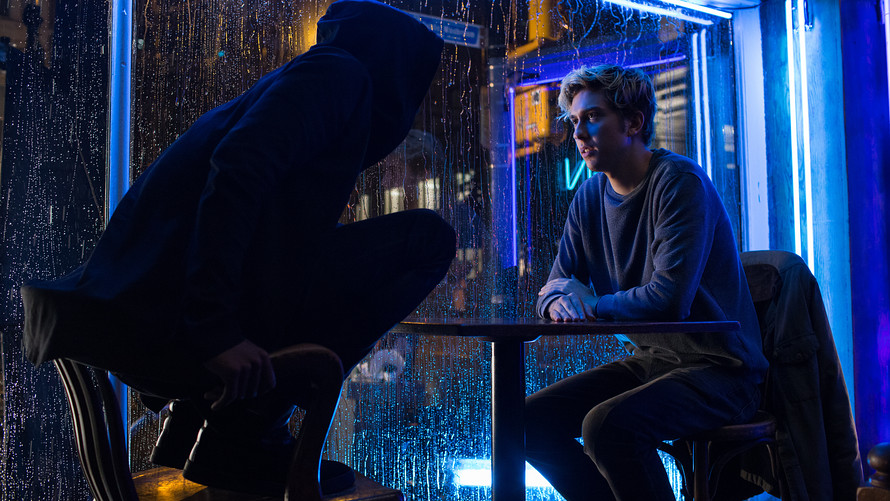Warning: Spoilers ahead. If you plan on watching this film, read this review afterwards. Or don’t. I’m not your dad.

Michael Bluth couldn’t have said it better: “I don’t know what I expected”. The trailers and pre-release “hype” for Netflix’s adaptation of Death Note did nothing to suggest that this would be anywhere approaching an enjoyable watch. This was going to be crap, and boy it sucks to be right.
Directed by Adam Wingard, this iteration of Death Note isn’t a shot for shot remake of the original anime/manga, though it does follow many of the same narrative beats as them. If anything, this is very much the Americanised version of events. Instead of an intelligent and nuanced game of cat and mouse, we get something that’s equal parts teen drama and Final Destination. Who cares about the plot or writing when we have sex and gore?
Based in Seattle, leading man/shitstain Light Turner (Nat Wolff) finds a Death Note on the floor and decides to play finders keepers, prompting the shinigami Ryuk, voiced brilliantly by Willem Dafoe, to show up and convince Light to use the Death Note. Anyone whose name is written in the book shall die, and oftentimes die violently too. So far, so similar, but here’s where we begin to diverge and the quality begins to dive.
Light shows the Death Note to love interest Mia Sutton (Margaret Qualley), with the notion that murdering people will have her jumping on his dick in no time. It does. Who said romance is dead? The pair then realise the potential that the Death Note has to change the world, but must contend with the world class detective known only as L (Keith Stanfield), who is determined to stop their reign of terror.
The original anime and manga could be described as a game of chess between Light and L, with the supporting characters being used as pawns in order to achieve the ultimate checkmate. While that notion is referenced by L in one particular stand-off between the two, this version seems more content to meander through a mediocre at best tale of the stupidity of youth and the corruption of power.
Nat Wolff’s portrayal of Light seems toothless, neutered and incompetent when compared to Light Yagami; a child out of his depth, trying not to drown. More than anything, he feels like an unwilling passenger to the maelstrom of chaos that surrounds the Death Note, and more importantly his girlfriend Mia.
In this version, she’s the one that displays characteristics most akin to the original Light. Time and again, she steps up to the plate to make the tough call whilst Light hesitates in the corner. As a character, she’s more engaging than Light, but the journey of her character seems to skip from “rebellious cheerleader” to “faux-messianic with a murder wide-on” without warning.
While their character flaws are the fault of the writers, the actors aren’t doing much to help matters either. Their delivery seems stilted, and the chemistry between the two almost non-existent. It’s hard to care about a film when it almost feels like the lead actors would rather be doing something else, though I can’t say I blame them for wanting to be somewhere other than this dumpster fire.
The only redeemable qualities in this 90 minutes of suffering come in the form of L and Ryuk. Keith Stanfield’s version of L is remarkably faithful, at least in comparison to the rest of the film. His mannerisms, like the way he sits or awkwardness when meeting people face to face, lead me to believe that Keith was the only person to show up on set with knowledge of the original material.
But even this brilliant detective is hamstrung by awful writing. How are we supposed to believe that this detective is a genius when a) his servant Watari disappears unannounced and only after 24 hours does that raise a red flag, and b) he doesn’t immediately suspect Mia is aiding Light despite seeing the two of them together? The film would have us believe that reason A clouds L’s judgement regarding reason B, but this is a man capable of making astute deductive leaps. Connecting Mia to Light is investigation 101, and he spends most of the film ignoring it.
Ryuk, on the other hand, shows up every now and again just to mess with Light. Despite the fact that Willem Dafoe’s voice work is exemplary, he’s wasted here. His role in the movie exists only to instruct Light on the usage of the Death Note, cast some intrigue about whether or not he’s gone into business for himself before pissing off again. He’s great every time he’s on screen, but he’s simply not on screen enough. Then again, if he was, the writers would probably balls it up further.
Admittedly, the comparisons to the original material might be unfair, as it seems like the writers and the director Adam Wingard wanted to put their own unique spin on things, but it’s one that has backfired. As a standalone film with its own unique merits, Death Note is disappointing and dull. When paired with the anime and manga, this version becomes much more abhorrent.
Some of the coverage you find on Cultured Vultures contains affiliate links, which provide us with small commissions based on purchases made from visiting our site.

